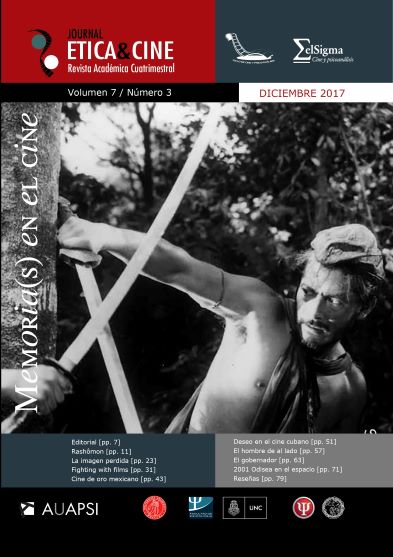The representation of the origin of humanity in ’2001: A Space Odyssey
DOI:
https://doi.org/10.31056/2250.5415.v7.n3.19627Keywords:
Stiegler, Technics, Time, AnticipationAbstract
The relations between humanity and technics confront thinking with a series of paradoxes. In order to start our exposition we return to the synthesis elaborated by Andrew Feenberg in relation to this problem. Then we focus on the exposition of french philosopher Bernard Stiegler’s propositions, who has attempted to give an answer to this problem through an original theoretical development. We return succinctly to the concepts of technical system, tendency and anticipation in order to consider the commentary and appropriation that the french philosopher makes of the paleoanthropological discoveries of Léroi-Gourhan. Finally we focus on some remarks in relation to the movie “2001: Space Odyssey” in the light of this issues, in order to apply the previously presented concepts.References
Bergson, H. (2007) La evolución creadora, Buenos Aires: Cactus.
Bodei, R. (2006) Destinos personales, Córdoba: El cuenco de plata.
Feenberg, A. (2009) Ten Paradoxes of Technology en Techn?, vol. 14, no. 1. Texto disponible en: http://www.sfu.ca/ andrewf/paradoxes.pdf].
Heidegger, M. (1994) Conferencias y artículos, Barcelona: Ediciones del Serbal.
George Liddell & Scott (1940) A Greek-English Lexicon, Oxford: Clarendon Press.
Léroi-Gourhan (1999) El hombre y la materia, Buenos Aires: Taurus.
Nietzsche, F. (1996) Humano, demasiado humano, Madrid: AKAL.
Simondon, G. (2007) El modo de existencia de los objetos técnicos, Buenos Aires: Prometeo.
Stiegler, B. (2002) La técnica y el tiempo I. El pecado de Epimeteo, Gipuzkoa: Hiru.
Stiegler, B. (2001) La técnica y el tiempo III. El tiempo del cine y la cuestión del malestar, Gipuzkoa: Hiru.
Downloads
Published
Issue
Section
License
Los autores que publiquen en Ética y Cine Journal aceptan las siguientes condiciones:
Los autores/as conservan los derechos de autor © y permiten la publicación a Ética y Cine Journal, bajo licencia CC BY-SA / Reconocimiento - Reconocimiento-CompartirIgual 4.0 Internacional. La adopción de esta licencia permite copiar, redistribuir, comunicar públicamente la obra, reconociendo los créditos de la misma, y construir sobre el material publicado, debiendo otorgar el crédito apropiado a través de un enlace a la licencia e indicando si se realizaron cambios.

Este obra está bajo una licencia de Creative Commons Reconocimiento-CompartirIgual 4.0 Internacional.




